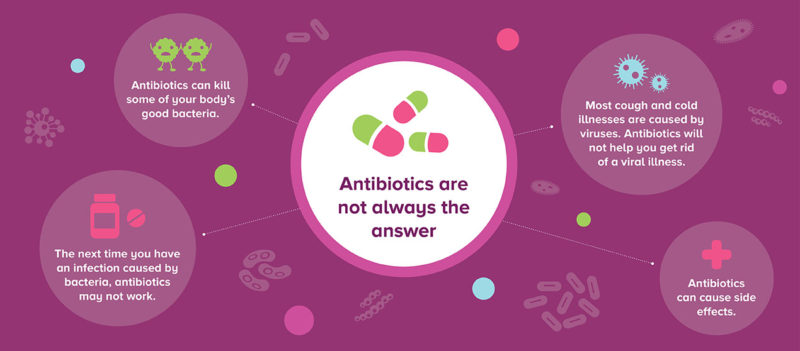You’ve likely heard it from your doctor time and again: Antibiotics won’t work against a viral illness. But why not? That’s a good question, and the answer starts with the differences between viruses and bacteria.
Virus Versus Bacteria
As a pediatric infectious disease specialist, one of my roles is to know the ins and outs of both viruses and bacteria. In order to understand why antibiotics are only effective against bacterial illnesses, we must first understand how these organisms live and function. Viruses and bacteria are quite different in the way they behave and the way they’re built.
Viruses
Viruses are tiny. Outside of the human body, they can’t live on their own for very long. To survive, they need to be inside a human body. Viruses can spread from person to person, but in general they need to be in close contact with people and they need our bodies to help survive and replicate.
Most illnesses in children are caused by viruses, including standard coughs and colds, as well as respiratory illnesses and gastroenteritis, and most fever illnesses.
Although viruses can make you fairly sick, they almost never cause permanent injury or disease. Most children recover fully from a viral illness even without treatment. (Exceptions include viruses in children with immune system problems or an underlying condition such as heart or lung disease.)
Bacteria
Bacteria are much larger than viruses and they can live on their own. They have all the machinery and materials they need to survive outside of the human body. The antibiotics we use to treat bacteria target that machinery.
With bacterial infections, many will continue to get worse without treatment, and the illness can sometimes cause serious problems or complications that can be permanent. Treatment with antibiotics addresses both the illness itself, as well as helps prevent complications from developing.
So why do antibiotics only work against bacteria?
Because of the way bacteria are made, it has been possible to develop drugs that target the functions of the bacteria that allow it to survive and cause disease. Since viruses are made differently, antibiotics are not effective against them. And because most illnesses in children are caused by viruses, in most cases antibiotics won’t be helpful to fight those.
Why is it bad to use antibiotics if they’re not needed?
There are two important reasons why doctors do not want to prescribe antibiotics when they suspect an illness is viral:
- If bacteria are exposed to antibiotics multiple times, the bacteria can eventually become resistant, meaning they will fight the effects of the drug. That means the more a child receives antibiotics, the more likely their next infection will be caused by a bacteria that is difficult to treat. This is also why your doctor will look at antibiotics your child has received in the past, and sometimes chooses a different type if your child has been treated with an antibiotic recently.
- The second reason for not overprescribing antibiotics has to do with what we call good bacteria. We all have bacteria on our bodies, and in most cases those bacteria are beneficial. In fact, they can help us from getting viral infections. When we take antibiotics, the medication not only gets rid of the illness-causing bacteria, but also gets rid of those good bacteria for a period of time. So if we treat with antibiotics too often, we wipe out those beneficial bacteria, and it makes us more likely to get sick in the future. There is growing evidence that beneficial bacteria also help prevent certain diseases including allergy-induced asthma, obesity, and heart disease. So it’s critical that we protect that bacteria and avoid using antibiotics unless absolutely necessary.
When should I call the doctor?
Many times the symptoms of a virus and a bacterial illness are similar. Viruses usually don’t make kids as sick as bacteria do, and with a virus, children typically get better after a few days. Determining the difference is often a matter of how long your child is sick and how sick they are.
In general, I recommend calling your pediatrician if:
- Your child has a fever that lasts 3 days or more.
- Your child is sick and is not improving after 3-4 days of illness. Signs that your child isn’t getting better include not eating and/or drinking as much as usual and not acting at their normal level of activity.
- Your child is having difficulty breathing.
If you have additional questions, or if your child is experiencing any of these symptoms, we recommend contacting your pediatrician.






What is interesting to me is that Drs. have seen this coming for decades, and warning folks about it. Yet, it takes a Dr. to prescribe antibiotics. Drs. are causing these issues, why? In my layman’s opinion, they shouldn’t be issued to a patient till needed. The body does a pretty good job of defending itself, let it until it is apparent that the patient isn’t able to cope with the infection. I understand that Drs. face tremendous pressure from patients, and I understand that waiting till one is sure that antibiotics are necessary may cause more deaths. It may already be too late to reverse this issue. Sadly, we will eventually be back to the times when we didn’t have antibiotics in the Drs. arsenal. Then there will be many more deaths.